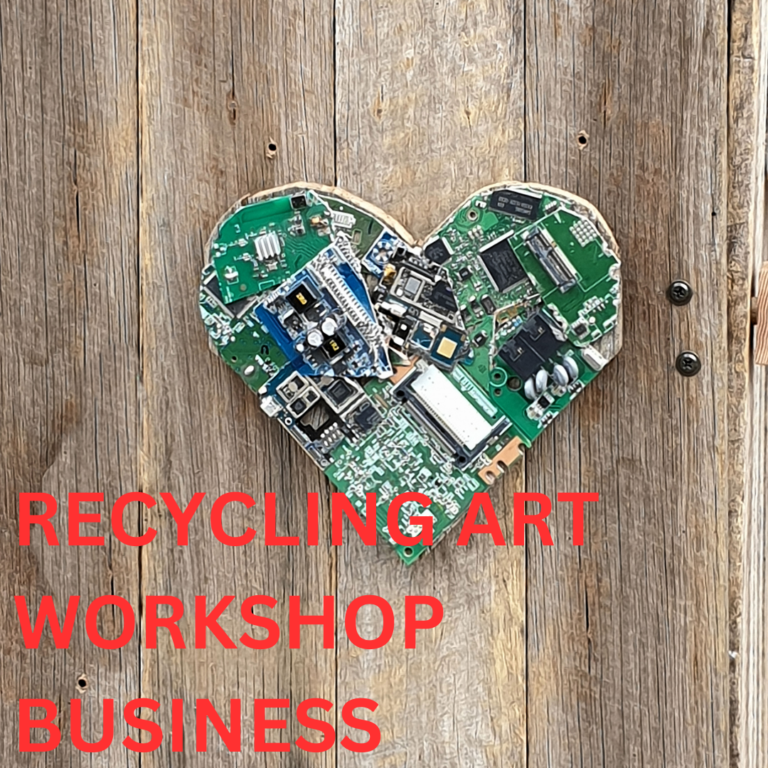Starting a Recycling Art Workshop Business: A Creative and Sustainable Venture
In a world where environmental consciousness is more important than ever, blending creativity with sustainability presents a unique and impactful business opportunity. A Recycling Art Workshop combines the joy of artistic creation with the practical need to reduce waste. By offering workshops where participants craft art pieces or functional everyday items from recycled materials, you can foster creativity, promote eco-awareness, and build a profitable business. This article explores the concept, benefits, and actionable steps to establish a successful recycling art workshop.
What is a Recycling Art Workshop?
A recycling art workshop is a hands-on event where participants use recycled or upcycled materials to create art, crafts, or practical objects. These workshops appeal to a wide audience, including schools, community groups, families, and eco-conscious individuals. Projects might range from sculpting with scrap metal to creating jewelry from bottle caps or weaving baskets from old newspapers. This concept encourages people to see waste as a resource while exploring their artistic side.
Why This Business Idea is Valuable
- Promotes Sustainability
- Recycling workshops help reduce waste and teach participants the value of reusing materials.
- By inspiring eco-friendly practices, you contribute to a cleaner environment.
- Encourages Creativity
- Crafting with unconventional materials challenges people to think outside the box and enhances problem-solving skills.
- Community Engagement
- Workshops can bring communities together and raise awareness about waste reduction in a fun and interactive way.
- Revenue Potential
- Charge per participant or offer premium workshops with specialized materials and expert guidance.
- Explore additional revenue streams through corporate events, school programs, and merchandise sales.
- Low Startup Costs
- Materials for the workshops can be sourced from donated or collected recyclables, minimizing initial investment.
Setting Up Your Recycling Art Workshop Business
1. Identify Your Target Audience
- Schools and Educational Institutions: Workshops can complement art, science, or environmental studies curricula.
- Corporate Teams: Offer team-building activities with a sustainable twist.
- Families and Individuals: Provide a creative weekend activity for people of all ages.
- Community Groups: Engage local communities with workshops tailored to their specific interests.
2. Develop a Range of Workshop Ideas
- Artistic Projects: Create sculptures, mosaics, or paintings from recycled materials.
- Functional Items: Teach participants to make tote bags from old T-shirts, planters from tin cans, or furniture from wooden pallets.
- Seasonal Crafts: Offer workshops for holiday decorations, such as ornaments made from bottle caps or wrapping paper from old newspapers.
- Advanced Workshops: For experienced participants, explore intricate crafts like jewelry making or upcycled fashion.
3. Sourcing Materials
- Partner with local businesses, schools, or community centers to collect recyclable materials.
- Encourage participants to bring their own items to reuse, such as old clothes, cardboard, or plastic bottles.
- Collaborate with recycling centers for bulk material donations.
4. Find a Suitable Location
- Options: Rent a community hall, use your own studio, or partner with local schools or art centers.
- Ensure the space has enough room for participants, tools, and materials.
- Opt for locations with good lighting and ventilation for a comfortable and safe environment.
5. Invest in Tools and Supplies
- Basic tools: scissors, glue guns, paints, and brushes.
- Specialized tools: sewing machines, drills, or wire cutters (depending on the projects).
- Safety equipment: gloves, goggles, and aprons.
6. Pricing Your Workshops
- Charge per session, with different rates based on the complexity and duration of the project.
- Offer package deals for multiple sessions or family/group discounts.
- Consider providing free introductory workshops to attract customers and generate word-of-mouth marketing.
7. Marketing Your Business
- Social Media: Share before-and-after photos of projects, testimonials, and behind-the-scenes content.
- Community Partnerships: Collaborate with local schools, eco-groups, and businesses to promote your workshops.
- Events: Host free or low-cost workshops at community fairs or green expos to gain exposure.
- Website and Online Booking: Create a professional website showcasing your workshops, schedule, and pricing. Allow participants to book sessions online.
Benefits for Participants
- Eco-Awareness
- Learn the importance of recycling and reducing waste in daily life.
- Creative Fulfillment
- Enjoy the satisfaction of transforming waste into something beautiful or functional.
- Skill Development
- Acquire new crafting skills and techniques that can be applied to future DIY projects.
- Social Interaction
- Meet like-minded individuals and collaborate on creative projects.
- Cost-Effective Creations
- Crafting with recycled materials is budget-friendly, making it accessible to all.
Challenges and Solutions
- Material Shortages
- Solution: Establish long-term partnerships with local recycling centers and businesses for consistent material supplies.
- Participant Safety
- Solution: Ensure proper safety measures are in place, such as gloves and goggles, and provide clear instructions on tool usage.
- Engaging Diverse Audiences
- Solution: Offer workshops at different skill levels and customize content to suit specific groups.
- Marketing to the Right Audience
- Solution: Use targeted ads and collaborate with eco-friendly influencers to reach your ideal customers.
Future Growth Opportunities
- Corporate Sustainability Programs
- Many companies are looking for eco-friendly team-building activities. Position your workshops as a fun, impactful option.
- Partnerships with Schools
- Integrate your workshops into school programs to teach students about recycling and creativity.
- Online Workshops
- Expand your reach by offering virtual sessions with materials shipped to participants in advance.
- Merchandise and DIY Kits
- Sell kits containing recycled materials and instructions for popular projects.
- Pop-Up Workshops
- Host short-term workshops at festivals, markets, or malls to attract new customers.
Why This Business is Sustainable and Future-Proof
- Environmental Impact
- Recycling art workshops directly contribute to waste reduction and promote sustainability.
- Growing Awareness
- As consumers become more eco-conscious, businesses with green initiatives are increasingly favored.
- Unique Selling Point
- Unlike traditional art classes, recycling workshops combine creativity with a meaningful purpose, making them stand out.
- Adaptable to Trends
- You can incorporate trending materials or techniques, such as upcycled fashion or zero-waste crafting.
Conclusion
A recycling art workshop is a business idea that combines creativity, community, and sustainability. By transforming waste into art or practical items, you can inspire eco-consciousness, foster creativity, and build a profitable venture. With careful planning, effective marketing, and strong community engagement, your recycling art workshop business can thrive and make a meaningful impact on the environment.
Now is the time to turn trash into treasure and creativity into a sustainable business model. Whether you’re passionate about art, the environment, or community building, this venture offers the perfect blend of purpose and profit.



